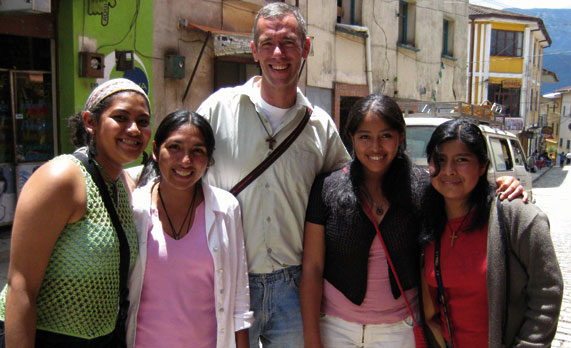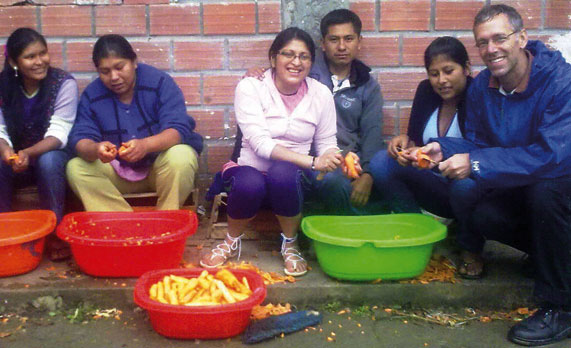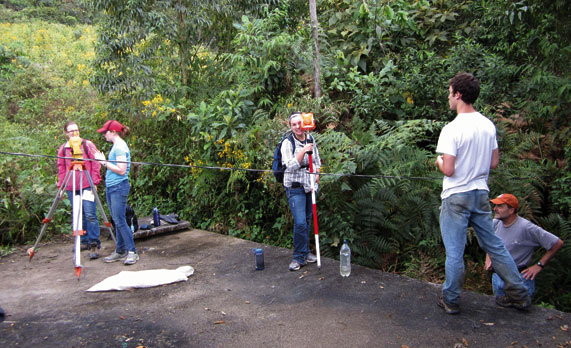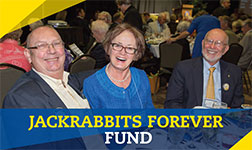
In 1999, Hugh Smeltekop walked onto the campus of Unidad Académica Campensina in rural Bolivia and knew he was exactly where he needed to be.
Fifteen years later, Smeltekop is still at the university, but much has changed. Once a volunteer, Smeltekop recently served as the director general of the college located in Carmen Pampa, Bolivia
In 1999, Hugh Smeltekop walked onto the campus of Unidad Académica Campensina in rural Bolivia and knew he was exactly where he needed to be.
Fifteen years later, Smeltekop is still at the university, but much has changed. Once a volunteer, Smeltekop recently served as the director general of the college located in Carmen Pampa, Bolivia.
Sister Damon Nolan founded the Catholic university in 1993 with the goal of providing higher education for children of farmers in rural Bolivia. In 2013, Sister Nolan passed her title as director general (president) to Smeltekop, who has taught classes, developed extension and research projects, and coordinated international projects with collaborating universities.
Smeltekop recently stepped down as director general to allow a Bolivian to take over the position.
“This is a missioner’s work—to work yourself out of a job,†said Smeltekop. “I had been grooming Father Emilio Medrano to take over, and the college’s board of directors decided he was ready this year.â€
Smeltekop will work on collaborating with the college and strengthening its relationship with the foundation it supports—the Carmen Pampa Fund—and other U.S. institutions.
The university employs 35 staff members and 80 professors, some who travel more than three hours from the capital city of La Paz to teach. When Smeltekop began volunteering at the university, less than 300 students attended. Now, enrollment is 700.
“I was a Peace Corps volunteer from 1994 to ’96 in Benin, West Africa, and from there I went to SDSU to study soil science with David Clay,†said Smeltekop. “I really wanted to go back overseas, though, so I talked to Harriet Swedlund in the office of international affairs.â€
Educational partnership

Hugh Smeltekop, one of eight individuals chosen in the 2013 class of Distinguished Alumni at SDSU, plays a very active role in students’ lives at the Unidad Académica Campensina. He said faculty and staff get to know each of the 700 students.
Swedlund pointed Smeltekop to Doug Malo, who was directing the program that SDSU had with the Carmen Pampa university.
SDSU and the Unidad Académica Campensina have retained an educational partnership since UAC’s start. The relationship began in 1993, and SDSU faculty and administrators have offered courses, workshops and training sessions and have advised student research projects.
In March 1999, Smeltekop began his volunteering project in Bolivia, which lasted four years. “Dr. Malo sent me to Bolivia to help organize the SDSU collaboration, and I fell in love with the college and its mission to help the rural poor get an education to return to their communities and make a difference.â€
Smeltekop returned to the U.S. from 2003 to 2005 to obtain a Ph.D. from Michigan State University, and then returned to Carmen Pampa.
After returning to Bolivia, Smeltekop realized he was on a mission to increase the ability for rural families to attend college. “I wanted to help them change their lives for the better,†he said.
Life at UAC
All UAC students live in dorms that have a large room with 10 to 20 beds; summer camp-like. They have classes Tuesday through Saturday, rest Sundays, and complete their required scholarship hours and community service Mondays. Students are required to do 80 hours of community service each semester to help pay for their education.
Each week, a student completes four hours of community service—doing construction or maintenance on campus, or working on one of the university’s farms picking coffee, hoeing or harvesting vegetables and caring for pigs and chickens.
The students also run the cafeteria. Although there is a hired cook, students take turns peeling vegetables, serving food and cleaning the kitchen. Students have five obligatory classes about religion, ethics and the search for meaning.
Sports also play an important part of student life. However, the UAC has a casual playing environment as students gather outdoors to play basketball, volleyball, futsal and soccer.
Smeltekop said the faculty and staff get to know each student and live by their side, giving advice, praise and criticism when necessary, and sharing their path. “We believe strongly that our most important job as professors and administrators is to bear witness to our students, affirming them as people with real gifts to share with their communities and sharing of our own paths,†he said.
Student perspective
Logan DeBoer, a December 2013 civil engineering graduate, traveled to Bolivia in December 2012 with Engineers Without Borders.

SDSU’s Engineers Without Borders has traveled to Carmen Pampa to install water chlorinators and view sites to install future chlorinators.
While in Bolivia, DeBoer helped adjust a chlorinator to disinfect the university’s water, with plans to add more chlorinators in the future.
He traveled with nine other students and two trip advisers. The group flew into La Paz. “Hugh picked us up from the airport and was very welcoming,†said DeBoer, who is originally from Clear Lake. “He made us feel like we were at home in Bolivia, as odd as that might seem.â€
The city of La Paz is 11,975 feet above sea level and built on steep hills. “It was a really cool drive through the mountains,†said DeBoer. “We saw a bunch of monkeys, and trees and waterfalls were everywhere. We were in what was a considered a cloud forest.â€
DeBoer said Smeltekop gave the engineering students a tour upon arriving on campus. He said living there for a week was completely different than living at SDSU. “We manually had to turn on the shower heat, slept in rooms with bare concrete floors, and just lived minimally,†said DeBoer. “It was so much different than what we were used to. There were only a couple buildings on campus that had Internet. It felt like we were in the middle of nowhere.â€
The engineering students arrived at the end of UAC’s school year. However, there were a few students still doing service projects.
DeBoer was impressed with the food in Bolivia. “It was always really good,†he said. “We usually had beef or chicken, rice and vegetables, but we had to be careful with the vegetables because we weren’t used to the water.â€
During the evenings, the SDSU students sometimes had supper with Hugh, went to church, or played cards with other college students from Bolivia. “One night we went to a Christmas service and meal with Hugh and his mother, and another night we went to a baptism in Coroico,†said DeBoer. “We were really exposed to the culture in rural Bolivia.â€
Because of the language barrier, volunteers helped translate for the group.
“If I had the chance, I would definitely go back,†said DeBoer. “It was great getting to see a different part of the world. Hugh seemed like a hardworking and intelligent person. I could tell that he really liked to help people and had the desire to learn, but also help people learn.â€
SDSU visitors
Many individuals and groups from SDSU have visited Carmen Pampa to share their experiences and learn. “An international perspective is so important because it gives people the skills to respond to problems that transcend borders, and so many issues today transcend borders,†said Smeltekop.
“We all need a global understanding of the environment and the world’s immense biodiversity; of poverty and its causes and solutions; of diseases of humans, plants and animals; of how cultures give us new perspectives on the great issues of today. These immeasurable experiences are what will make responding to the future’s problems possible.â€
The best part
Trained as a scientist, the idea of miracles was problematic for Smeltekop. “My education taught me to look for logical explanations and laws of nature to explain the world, but when I look at what the university has accomplished, I have to believe that miracles are real,†said Smeltekop.
“Now, there is real opportunity and hope, where before, there was so little expectation for the most disregarded people to dream, and then transform that dream into something real,†he said. “There are still people here who don’t live with dignity, but education is changing that.â€
Over 400 graduates are working in rural areas in local government and schools, starting small businesses and foundations, and providing health care in rural hospitals and clinics. “The students are demonstrating that, against all odds and expectation, they CAN,†said Smeltekop. “That is inspiring to so many young people who come from the same places, normally so devoid of hope.â€
Smeltekop was honored as a member of the 2013 class of Distinguished Alumni at SDSU, because of his ongoing effort of helping students in Bolivia live a more positive life.
“Hugh has chosen to apply his tremendous talents not for his own personal benefit, but for the well-being of others,†said Tim Nichols, dean of the Van D. and Barbara B. Fishback Honors College. “Even as the university’s director general, Hugh chooses to live simply—in one small room with a mattress on the floor, a few changes of clothes and a stack of good books. He shares an old house with other university staff and volunteers.
“Hugh is truly of the people he serves, and shares all that he has with his students, colleagues and community,†said Nichols. “He is a leader, teacher, mentor, adviser, friend, Godparent, sponsor and brother to the people of Carmen Pampa, and to the Jackrabbits who are always near and dear to his heart. He is indeed an honorable man, who stands in solidarity with the poor.â€
Karissa Kuhle






